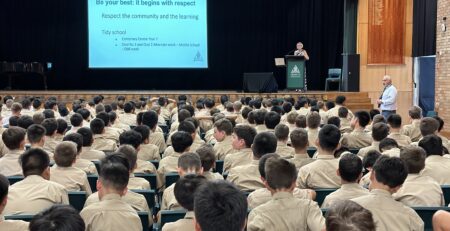Academic Focus
Setting Goals for Academic Engagement
This week’s Staff Development Day on Tuesday allowed, for the first time in more than two years, the whole Trinity staff to gather together, and then to meet in different teams throughout the day, to work collaboratively on outstanding teaching and learning for students. It was wonderful to be able to learn together in this way, sharing professional conversation and leveraging our collective expertise.
In the secondary school, one of the sessions focussed upon academic engagement and ways in which teachers can create learning environments to support student engagement. At Trinity, our approach to engagement emphasises both the way students feel about their learning and the actions they take to advance their learning – that is, we understand engagement to be about both emotional and behavioural participation. This approach accepts that, sometimes, we need to deliberately step first into behaviours that we know will support academic growth, and that positive feelings, such as enjoyment, satisfaction and confidence are likely to follow. Engagement, then, is both a personal responsibility of the individual student, as well as a responsibility of teachers.
We are very clear about the academic engagement behaviours we know make a difference for students, curating them in four categories: self-management, task management, learning focus and persistence. Each semester, a student’s Report describes appropriate engagement behaviours for their stage of development in these four categories and provides feedback on the demonstration of these behaviours in each learning context, or subject, a student undertakes. Teachers let students know whether, in a particular subject, they demonstrate these behaviours rarely, sometimes, often, consistently, or habitually. For me, it is the most valuable information presented to parents and students because it indicates a student’s strengths, and areas for improvement, in terms of the habits of learning he must acquire to be successful and continue a robust trajectory of personal academic growth. You don’t have to have the highest grades to achieve high engagement scores, but we do know that for most students, where your engagement score goes, your grade is likely to follow! There are many students who can attest to the way in which setting goals to improve their engagement has resulted in an improved grade as well.
Another aspect of our approach to academic engagement became clear as we examined the data around students’ Engagement Point Averages (EPA), or their collected and averaged engagement scores each semester, now that the School has been collecting this information for three years. The mean, or average EPA for each individual year group, has risen slightly since 2019 and has settled at around 4.0 out of 5.0. This sounds quite strong – and it is! We are delighted that this mean EPA represents consistent engagement in and across subjects. We have also begun to notice that 4.0 is a significant number, particularly in Years 11 and 12. Students who have an EPA of 4.0 or higher generally achieve or exceed their ‘expected growth’, from Year 10 to final credential results. Therefore, we are seeing that 4.0 is the benchmark to set, right from Year 7.
At the end of this term, students will receive Semester 1 Learning Progress Reports, including, on the front cover, their new EPA, graphed alongside their EPAs for previous semesters. We represent the EPAs in this way because we want to make growth visible: we want boys who make deliberate effort to improve engagement to see that improvement, and we want boys who commit to strong engagement from semester to semester, even though learning gets harder and harder, to see that consistent commitment – and enjoy it! And, of course, we will formally award students who achieve strong EPAs or significant EPA growth with a Head Master’s Academic Engagement Citation at the end of every semester.
As your son looks toward their Reports at the end of term, I encourage you to chat with him about his actions, as well as his feelings, in each subject. I encourage you to focus on the EPA and what he would like to achieve in this area. There is a whole term of learning before Reports are produced, and that is more than enough time to set some goals and achieve them!
Deborah Williams | Academic Dean
















